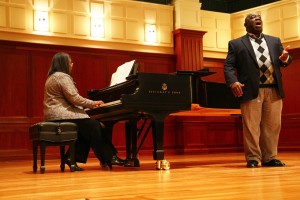By Sydnee Weinbaum
Correspondent
Oral Moses and Rosalyn Floyd performed spiritual music in the Mildred and Earnest E. Mayo Concert Hall for students and faculty as part of the Brown Bag series on Friday, Oct. 28.
As a young boy growing up in South Carolina, Moses’ love for spiritual singing was influenced by his family. One family member in particular, his Aunt Lulu, was his main inspiration.
“It was not so much how she sang, but her rhythm,” Moses said. This sparked an interest in singing spiritually.
Floyd, a pianist, also grew up in South Carolina. Although she cannot personally sing, she said, “I tend to want to sing on the piano.” She also said her interest in spiritual music is due to her mother as well as her college experiences. Today, Floyd is a professor of piano, accompanying and music theory at Augusta State University.

The Georgian Spiritual Ensemble accompanied Floyd and Moses on Saturday, Oct. 29. The Ensemble is a musical group that uses music to inform the world of Africans’ plights, sufferings and feelings during the time of slavery in America. The horrors and suffering that these people went through are explained through these spirituals.
“If you were taken away from your family and loved ones, would you go willingly?” Moses asked the audience. Millions of slaves were faced with this question. These songs depicted the anguish these people experienced. The millions of free people that were brought to America to be enslaved were degraded as human beings. “They were cargo,” said Moses.
According to Moses, “If you take the melody and rhythm away, you have the words of people crying out.” These spirituals allowed slaves to share their problems.
“It opened up a new part of American music and culture to me that I was not familiar with,” freshman communication studies major Jaqueline Ilkowitz said.
“Spirituals have a style. You have to learn it,” Floyd said.
“You must have good rhythmic sense and melodic sense,” Moses agreed, going on to say, “You have to know a bit about the culture.” He recommended that students travel around the world in order to understand other cultures.
“It is so significant to bring culture into music,” Moses said.
John Laughton, dean of the school of arts and communications, agreed.
“All music has context,” he said. “Without understanding its context, you lose the flavor of it.”
“I enjoyed the way of interspersed music and discussion so we could see the concepts play out,” freshman Adam Braun, open options arts and communications major, said about the presentation.






